« March 2009 | Main | May 2009 »
April 28, 2009
The Spirit

Frank Miller - 2008
Lionsgate Entertainment Region 1 DVD
The last time I read what were then known as comic books with any degree of regularity, it was in the Seventies, with the Warren Magazines version of The Spirit. What attracted me Will Eisner's work was the sense of humor. Wry and self-deprecating, the character and series itself existed on a special place that combined a self-awareness of the ridiculousness of the situations with graphics that anticipated the comic book parodies that Mad Magazine would create a few years later. Just looking at the magazine covers were enough to make clear that the Spirit in Frank Miller's film was not quite like Eisner's Spirit.
Making films from comic books has always struck me as a dubious enterprise because of the expectations of the look and tone based on the source material. The films I do like are those made by directors whose particular visions of the world I generally enjoy, being Tim Burton's Batman Returns and yes, Richard Lester's Superman films. It could also be that I had less of an emotional investment in Bob Kane's, or Siegel and Schuster's, versions of their characters. I should also note that two of the best comic book style films were not based on comic books, being Darkman and RoboCop. All of which is to say that I was hoping for film version of Will Eisner's Spirit but what is on screen is mostly Miller's moodiness.

While I would not criticize Frank Miller move from comic book artist to filmmaker, he was not the person who should have translated Will Eisner to film. I didn't mind that newspaper seller Ebony White was nowhere to be seen, or that the story takes place in an alternate universe of vintage cars, skateboards, video cameras, and a host of other anachronisms exist. What I did miss was the humor that someone like Sam Raimi or Paul Verhoeven could have provided. Too often I felt that Miller was trying to prove that if he couldn't film The Dark Knight, he would at least film dark nights.
Frank Miller's The Spirit has more in common with the grimness of Sin City or 300. Any attempt to mimic Eisner's playfulness comes down with a thud. References to former Eisner assistant Jules Feiffer, or the tagline to Richard Donner's Superman come across as heavy-handed, a smirk rather than a chuckle. Miller's intense seriousness may be right for his own work, but works against the, er, spirit of Will Eisner. I'm not sure which contemporary director would have been best, but for me, the closest to the feeling I got from Will Eisner's comics was in Philippe De Broca's comic misadventure films with Jean-Paul Belmondo, where sight gag followed sight gag, with a hapless hero and his femme fatale.
On its own merits, The Spirit is as visually as well composed as one should expect from Miller, working here with Bill Pope. Pope has notably worked with Sam Raimi on several films which share something of a comic book style, even when they weren't based on comic books. Gabriel Macht looks about right as the title character, but the best reason to watch the film is for the trio of curvy actresses: Scarlett Johansson, Paz Vega and Eva Mendes. Sure, Eisner's Plaster of Paris was blonde, but when Vega does her dance with her long knives, such considerations disappear. Disregarding all of the digital enhancement that went into making The Spirit, critical considerations also evaporate at the sight of three voluptuous women who, at least on film, more than match the imaginings of any artist.

Posted by Peter Nellhaus at 10:49 AM | Comments (1)
April 26, 2009
Coffee Break

Vitaliano Trevisan and Michela Cescon in Primo Amore (Matteo Garrone - 2004)
Posted by Peter Nellhaus at 12:14 AM
April 24, 2009
Ken Annakin: 1914 - 2009

Crooks Anonymous (Ken Annakin - 1962)
In remembrance of Ken Annakin, I'm reposting this favorite image from one of his funniest films. I wrote about Annakin at length last February, discussing his autobiography and some of his films. I have nothing to add except that as more of his films become available on DVD, there is more to discover about a director who would jump into film projects with the same spirit of adventure as many of his characters. And if that wasn't enough, Annakin introduced a young actress named Julie Christie to the big screen.

Posted by Peter Nellhaus at 12:09 AM
April 23, 2009
Ghost Train

Otoshimono
Takeshi Furusawa - 2006
A.D. Visions Region 1 DVD
To what extent does one consider the horror film as a work of symbolism rather than just evaluating the work for its surface values? I was ready to dismiss Ghost Train until a point approximately fifty minutes into the film there seemed to be more than the familiar Japanese horror film tropes. There is also a thread that seems to be pan-Asian, with the ghost story as a metaphor for urban alienation. What piqued me was the realization that even though Ghost Train takes place in Tokyo, for much of the film, it is a strangely empty, depopulated Tokyo that we see. And while I can't really say that Ghost Train is about female empowerment, the male characters are essentially weak, if not comfortably impotent. Without undue emphasis, Ghost Train can be read as a look at the tenuous sense of family and belonging in contemporary Japan.
The symbolic aspects of Ghost Train seem appropriate when one considers that director and co-writer Furusawa previously worked as an assistant to Kyoshi Kurosawa on two films, as well as co-writer with Kurosawa on Doppelganger. While Ghost Train does not achieve the creepiness of Kurosawa's films, there are a few thematic similarities. That much of the horror is suggested also seems to indicate that Furusawa was making a film for a wider, younger audience. Also referenced lightly is H. P. Lovecraft, with the main character, Nana, considering Miskatonic University, as well as a glance back at Quatermass and the Pit, the cult classic of horror and urban alienation in the tunnel of a subway station.

The Ghost Train is a subway train, with a ghost that primarily haunts a station. The Japanese title translates as "lost and found", and the story is about lives lost and found in the dark of the subway tunnels. A significant part of the film also takes place in the lost and found section of the train company, where the story is partially explained. Nana loses her little sister, Noriko, as well as coming close to losing her hospitalized mother. Isolated from her peers at high school for being too studious, Nana finds friendship with bad girl Fujita in the course of discovering the cause for the disappearance of several people who had all found the same train pass. Nana also finds a new sense of self at the end of the film.
Ghost Train was co-written by a woman, Erika Tanaka, who seems, from what little is available in English, to be interested in women with paranormal encounters. The only man who takes action is the train operator who was confined to the lost and found room after claiming to see something in a tunnel. Even then, it only after the badgering of Nana that he investigates the mystery of the tunnel. The other men are simply interested in keeping the trains running as scheduled and covering any possibility of scandal. Some parts of the story, even within the context of a horror film, don't make sense. There is too much reliance on mysterious long haired women and pale children who seem to have returned from the dead. Still, if one is to view popular culture as indicative of times, Ghost Train is worth a look at a handful of young Japanese women who refuse to be passive about their lives, or even their deaths, while the men clumsily uphold a status quo that is quickly disappearing.

Posted by Peter Nellhaus at 12:36 AM
April 21, 2009
My responses to "PROFESSOR PEABODY'S HYSTERICAL HISTORICAL WAYBACK SPRING BREAK FILM QUIZ"
Once again, it's the seasonal quiz at Sergio Leone and the Infield Fly Rule. Because of my current work schedule, it took me a couple of nights to answer the questions. While some of my answers duplicate those given by others, it is purely coincidental.
1) Favorite Biopic: Raging Bull. For so many reasons.

2) Dyan Cannon or Tuesday Weld?: Dyan is cute, but Tuesday Weld was in some better films, especially Pretty Poison and Bachelor Flat.
3) Best example of science fiction futurism rendered silly by the event of time catching up to the prediction: How about me being silly, thinking that the world would end based on George Pal's version of The Time Machine.
4) Annette Funicello & Frankie Avalon or Troy Donahue & Sandra Dee?: Troy and Sandra have Delmer Daves' A Summer Place and Douglas Sirk's Imitation of Life on their resumes. Case closed.
5) Favorite Raoul Walsh movie?: Only one? The Roaring Twenties.
6) Sophomore film which represents greatest improvement over the director’s debut: Repulsion, primarily because it set the stage for Polanski's career as a major, English language filmmaker.
7) Ice Cube or Mos Def?: Mos Def, mostly for The Hitchhiker's Guide to the Universe.
8) Favorite movie about the music industry: Grace of my Heart.
9) Favorite Looney Tunes short (provide link if possible): Booby Hatched, by Frank Tashlin, about an unhatched egg named Robespierre.
10) Director most deserving of respect or upwardly mobile critical reassessment: Gordon Douglas is getting better with age. If nothing else, he was a solid craftsman.
11) Ruth Gordon or Margaret Hamilton?: This Bud's for you - Margaret Hamilton, based on her appearance in Brewster McCloud.
12) Best filmed adaptation of a play: Roman Polanski's version of the Scottish play.
13) Buddy Ebsen or Edgar Buchanan?: "Petticoat Junction" wins here. Edgar Buchanan.
14) Favorite Jean Renoir movie?: Boudu Saved from Drowning.
15) Favorite one-word movie title, and why: Dick. Just no way you can improve upon the use of this title for a film about Nixon.
16) Ernest Thesiger or Basil Rathbone?: Rathbone, more for the horror films he showed up in during the end of his career.

17) Summer movies—your highest and lowest expectations: I expect to enjoy the coolness of my apartment watching DVDs. I am looking forward to Monster X Strikes Back: Attack the G8 Summit.
18) Whether or not you’re a parent, what would be your ideal pick as first movie to see with your own child (or niece/nephew)? Why?: I didn't see it with her, but the first movie I bought for my niece was Babe. Something a child could enjoy on her level but that an adult could watch and enjoy as well.
19) L.Q. Jones or Strother Martin: Jones, for directing A Boy and his Dog.
20) Movie most recently seen in theaters? On DVD/Blu-ray?: Theater: Scott Walker: 30 Century Man. On DVD: Frank Borzage's Lazybones.
21) Do you see more movies theatrically or at home? Why?: Home is where I range. Less distraction, comfortable seating, better food, better choice of films.
22) Name an award-worthy comic performance that was completely ignored by Oscar and his pals.: Eddie Murphy in The Klumps: Nutty Professor II. Not only were there several distinctly different characters, but Murphy reminded me how laugh out loud funny he could be.
23) Zac Efron & Vanessa Hudgens or Robert Pattinson & Kristen Stewart : Twilight of the high school musical? I'm going Hong Kong old school with Linda Lin Dai and Peter Chen Ho.
24) Name a great (or merely very good) movie that is too painful to watch a second time (Thanks to The Onion A.V. Club): William Wellman's Island in the Sky is a pretty good film with a performance by John Wayne that is worth noting. However, I almost tore my eyes out at the dorsal view of Andy Devine in swim trunks. At least he wasn't wearing Speedos.
25) Beyonce Knowles or Jennifer Hudson?: Beyonce is my dreamgirl.
26) Favorite Robert Mitchum movie?: The Yakuza.
27) Favorite movie featuring a ‘60s musical group that is not either the Beatles or the Monkees: Petulia, featuring The Grateful Dead and Big Brother and the Holding Company in performance.
28) Maria Ouspenskaya or Una O’Connor?: O'Connor is in more movies I like.
29) Favorite Vincent Price movie?: Tomb of Ligeia.
30) Name a movie currently flying under the radar that is deserving of rabid cult status.: John Woo's Red Cliff. A huge hit in Asia, but only available as an import DVD stateside. It's the top nominee for the Hong Kong Film Awards for good reason.
31) Irene Ryan or Lucille Benson (or Bea Benaderet)?: Bea Benaderet, for providing a voice for many cartoons including one titled Puss n' Booty. The perfect cartoon to be shown with a movie titled Dick.
32) Single line from a movie that never fails to make your laugh or otherwise cheer you up. (This may be obvious, but the line does not have to come from a comedy.): "This coffee's so thick a mouse can dance on it." from Convicts 4.
33) Elliot Gould or Donald Sutherland?: after MASH. Gould worked more with Alman as well as Ingmar Bergman. Sutherland was in more good films by more good directors with Don't Look Now and 1900 among the high points, plus Animal House. Sutherland also played Homer Simpson in Day of the Locust.
34) Best performance by a director in an acting role: Suzuki Seijun in Sleepless Town.
35) Favorite Barbara Stanwyck movie?: Young Babs: Bitter Tea of General Yen. Never ask a woman her age Babs: Forty Guns.
36) Outside of reading film criticism or other literature about the movies, what subject do you enjoy reading about or studying which you would say best enriches or illuminates your understanding and appreciation of life, a life that includes the movies?: Buddhism.
Posted by Peter Nellhaus at 12:31 AM
April 19, 2009
Coffee Break

Judith Godreche and Hai Truhong Tu in The Disenchanted (Benoit Jacquot - 1998)
Posted by Peter Nellhaus at 12:11 AM
April 16, 2009
The Peach Girl

Bu Wancang - 1931
Lianhua Film Company All Region DVD
Seeing Stanley Kwan's film Actress, about Ruan Lingyu, made me interested in seeing more than the excerpts included in Kwan's film. Billed here as Lily Yuen, Bu's film serves as a wonderful introduction to both Ruan and has also made me more interested in the other work of Bu, billed here as Richard Poh. Ruan was a few years younger than Janet Gaynor. To put Bu's film in the context of general film history, while Hollywood and Europe had completed their conversion to sound filmmaking, Asian films were still silent well into the early 1930s. Bu's film, with this one example, seems to be the work of someone who studied closely the work of D.W. Griffith and probably Frank Borzage. Both because of the star and the director, there should be motivation for greater film scholarship.
The basic story follows a classic silent film template as well. The young, but poor, daughter of a tenant farmer is in love with the son of the landowner. The conflicts here are of class as well as city boy and country girl. Chinese tradition is looked at both in terms of traditions regarding class and gender, as well as how some of the characters dress. Lim and Teh-en are the lovers, whose pure love is disrupted by both their own pride as well as that of their traditional parents. Teh-en's mother would rather pay of Lim and her family rather than allow her son to marry someone considered socially unacceptable. The title comes from Lim, as a small girl, having her life compared to a peach tree by her parents, with the blossoms compared to tears.

In setting up the relationship between Lim and Teh-en, they are introduced as five year olds, with the titles noting that children do not notice class difference. One very funny scene is of Lim and Teh-en joining some other young children, merrily flinging mud at each other. The country children are very informally dressed, in shorts and thin short sleeved shirts, with one small boy not wearing any pants. When one of the boys tosses mud onto Teh-en, it is an act both of camaraderie as a deliberate form of making the formally dress boy an equal to his new playmates. Teh-en's indignant mother, who makes a points of wiping the boy's hands whenever he touches Lim, finds her son as dirty as the other children. Teh-en is taken away, but not before mud is flung onto the mother, a shot as funny as any from Mack Sennett.
Bu's filmmaking style is classical in the best sense of silent film in the late Twenties. There is a frequent use of depth of field, of filming motion within the frame, as well as using traveling shots. In this regard, Bu's style is similar to that of some of the better American directors of the late Twenties. Bu began his career in what would now be call documentary films, and the footage of a fair seems to have been shot at a real event, judging in part from the crowds seen in an establishing montage. Some of the footage is mottled, but not enough to damage the charm of The Peach Girl. Bu's film would also suggest that, beyond its historical interest, there are other treasures of the silent era yet to be better known.

Posted by Peter Nellhaus at 12:46 AM
April 14, 2009
Fucking Nazis

My Heart is Mine Alone/Mein Herz - Niemandem!
Helma Sanders-Brahms - 1997
Facets Region 1 DVD

The Reader
Stephen Daldry - 2008
The Weinstein Company Region 1 DVD
Blaise Pascal's observation that the heart has its own reasons has become something of a cliche. Still, one can see the existence of relationships that from the outside make little sense. Helma Sanders-Brahms' film doesn't attempt to explain the relationship between Gottfried Benn and Else Lasker-Schuler. What is presented is almost an expressionist collage of conventional biographical re-enactment, stylized staging, and documentary. There is probably some dispute as to the nature of the relationship maintained by Benn and Lasker-Schuler. Sanders-Brahms might be said to be more interested in emotional, rather than factual truths.
Some might be pressed to imagine that mutual admiration between poets could transcend political differences, touched on in the film, as well as a significant difference in age, which the film does not mention. (It might be assumed that German audiences would be aware of the age difference between Lena Stolze and Cornelius Obonya.) Neither Stolze nor Obonya age much past their initial meeting in the film, perhaps signifying how they would always see each other. What would raise eyebrows is that Lasker-Schuler was open in her life and work concerning her Jewish identity, while Benn was a Nazi until he was pushed out in the late Thirties.

Sanders-Brahms flirts with the conventional biographical film, such as a scene where Lasker-Schuler tells Marc Chagall that he will be one of the most famous artists of the Twentieth Century. Where the film breaks with convention is in the form of dialogues between Benn and Lasker-Schuler, his poetry as a reply to her verse. Lasker-Schuler could be seen as the prototype of the performance artist, in her "Oriental" costumes. Benn later was awarded the Georg Buchner prize for his writings, which complimented his life as both a medical doctor and man of letters. Lasker-Brahms is presented as a kind of prophet who foresaw the folly of Germany's entry into both world wars, while Benn is seen as a well-meaning cad whose idealism blinded him to certain realities.
My Heart is Mine Alone may not explain fully the reasons for the passion between Benn and Lasker-Schuler, or why someone both bright and consistently rebellious as Gottfried Benn would embrace the Nazi philosophy, but on its own terms, it is a more truthful film than The Reader. By contrast, Stephen Daldry and screenwriter David Hare would want us to believe that Kate Winslet's character, Hanna Schmitz, became a Nazi because, as an illiterate, she really didn't know any better, and that she deserved a modicum of sympathy because her inability to admit to her illiteracy caused her to take a fall more severe than her fellow concentration camp guards. Even without the revelation of her background, there is no reason for teenage Michael Berg to even have an affair with the then thirty-six year old Hanna Schmitz other than he's young and she's Kate Winslet. The Reader is a more realistic film employing the techniques of traditional filmmaking, yet everything about it seems false and artificial compared to Helma Sanders-Brahms' film.
What may be more offensive is that The Reader only pretends to be raising questions about law, morality, and German guilt. The Reader is not about moral dilemmas but about creating audience sympathy for Berg and Schmitz because they have to deal with the serious questions. One might argue that Hanna Schmitz never really understands the implications of her actions and that suicide is as much of an escape as literature. I'm surprised no one retitled the film "Schindler's Booklist". Even Michael Berg's choice to not reveal Hanna Schmitz' illiteracy when it could make the difference in her trial strikes me as being dishonest at the very least from a legal standpoint, more so from a law student.
One of the questionable choices made by Daldry and Hare is to not include, as in the novel, that the newly literate Hanna not only learns to read the books read to her by young Michael, but also reads works by Primo Levi and Elie Wiesel. Within that context is conveyed a sense that Hanna Schmitz might have had a clearer understanding of her actions beyond following orders. The main difference between My Heart is Mine Alone and The Reader is that in Sander-Brahms' film, her lovers face the consequences of their actions, while Stephen Daldry would have you believe that being physically attractive is reason enough to excuse the most dubious legal or moral actions.

Posted by Peter Nellhaus at 05:30 PM
April 13, 2009
Coffee Break
.jpg)
Maggie Cheung in In the Mood for Love (Wong Kar-Wai - 2000)
More of my thoughts at Film for the Soul. Or you can meditate on this image of Maggie Cheung Man-Yuk while she contemplates making a cup.
Posted by Peter Nellhaus at 12:10 AM
April 12, 2009
Coffee Break

Zero Mostel in Du Barry was a Lady (Roy Del Ruth - 1943)
Posted by Peter Nellhaus at 12:16 AM
April 09, 2009
Red Cliff

Chi Bi
John Woo - 2008
Zoke Culture Region 0 DVD
After seeing Red Cliff, the large number of nominations amassed for the Hong Kong Film Awards is less surprising. John Woo's film is meant to be seen on the big screen, the bigger the better. There are a few missteps, primarily the use of the zoom meant to underline in big strokes the seriousness of some of the characters' proclamations in the early parts of the film, and the battle scenes that are too overly fragmented. Based on the same source material as Three Kingdoms, Woo's film is certainly the better, although the overlapping of the stories is minimal.
Woo primarily is interested in the alliance formed by Zhou Yu and Zhuge Liang on behalf of their two kingdoms against the Han Dynasty. Played by Tony Leung Chiu Wai and Takashi Kaneshiro respectively, the film has some similarity with Woo's other films about men of action who are guided by idealism against those who are motivated primarily by self-interest. Zhou Yu and Zhuge Liang come to terms not by verbal dialogue, but through a musical duet on string instruments. Zhuge Liang endears himself to Zhou Yu and his wife initially by intervening in the breech birth of a horse. It is a scene that might seem extraneous to the main spectacle. The scene serves to quickly humanize Woo's main protagonists, men of power and position, interested in exercising that power and position judiciously, compared to the Han Dynasty's Cao Cao, who commands his large military force for disguised personal gain.

One of the nicest moments is when Zhou Yu is introduced. The soldiers of Sun Quan are gathered to demonstrate their readiness to fight when they are silenced. A young boy is playing a flute, not badly, but some of the notes are off key. Zhou Yu walks up to the boy who is sitting with his grandfather. Asking for the flute, Zhou Yu takes out a knife, only to whittle a couple of the air holes in the flute, before handing the flute back. The narrative stops while the boy plays his flute, to an orchestrated sound track. It's the kind of scene that should remind some of how music is used in some of Sergio Leone's films, most famously with the character of Harmonica in Once upon a Time in the West. One of the best assets of Red Cliff is the justly nominated, rousing score by Taro Iwashiro, the kind of music that sets the pace for the rest of the film in the way that Elmer Bernstein and Miklos Rozsa would do in their best scores in the early Sixties.
John Woo's most famous Hong Kong films are the kind best described with the term "bullet ballet". The action direction here is by Corey Yuen. Using swords, spears, and bow and arrow, and working with teeming extras, there is less emphasis on individuals than in previous Woo films. There is time to admire one oversized, bellowing general who knocks down a horse with its rider, and Tony Leung pulling an arrow out of his shoulder to personally return it to the archer. Another change from prior Woo films is the inclusion of women in the action, with feisty proto-feminist Vickie Zhao leading her army of female archers.
The first of a two part film, Red Cliff actually ends before the legendary battle take takes place at the title location. It the film ever gets a theatrical showing in the United States, it could well be a severely edited version of the two parts. Seeing the film on DVD seems like a necessary compromise in order to view Woo's film in its entirety. I wouldn't call Red Cliff a return to form for John Woo in style, because that never left him when allowed to make films his way, but there is greater substance than in silly, if entertaining, Paycheck. Yes, the doves make an appearance as they do in other Woo films, although pigeons also figure in the story. One of the more spectacular shots follows one pigeon on flight from the South Palace over the hundred Han battle ship. Between that jaw dropping extended shot to the mountain scenery, for me, Red Cliff could best be described by the adjective I would not throw about lightly: breathtaking.

Red Cliff is available from HK Flix, while Part II is available for advance orders.
Posted by Peter Nellhaus at 12:07 AM | Comments (2)
April 07, 2009
Voices
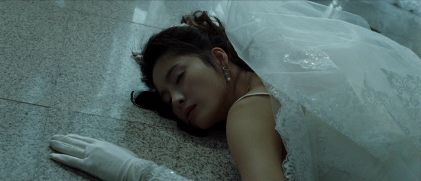
Du saram-yida
Oh Ki-hwan - 2007
Lionsgate Region 1 DVD
For those who complained about the selection of films offered by Tartan Asia Extreme, Voices could well make you change your mind. As handsomely produced as it is, the Korean Voices is also so derivative that I'm almost convinced it was for that reason the film was included in the "After Dark Horrorfest" series of eight films just released on DVD. I'm not familiar with the comic book that served as the basis for the film. Voices is a mash-up of elements from Whispering Corridors with its high school girl protagonist, The Grudge's family curse, and a plot twist familiar to all who have seen A Tale of Two Sisters. Even worse, the more that is explained, the less the film makes any kind of sense.
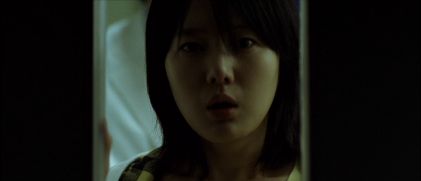
Voices, a title that seems randomly chosen, begins with a small boy finding his mother dead, blood smearing the illuminated television set. News reports feature stories about random murders taking place. Ga-in and her family attend a wedding celebration which ends when the bride, Ga-in's aunt, falls from a balcony to the floor. Later that night, Ga-in witnesses her hospitalized aunt being murdered by another woman. Afterwards, Ga-in finds her relationships with schoolmates and teachers more troubled. Another class mate, a young man with a mysterious past, advises Ga-in to trust no one, not even herself.
There is little about Kang Kyung-ok or the original story available in English. What seem apparent is that the filmmakers had little confidence in Kang's story, and in the process created a film generic in the worse sense, and incoherent. Replacing the title, which translates as "Someone Behind You" does the film no favors as well in attracting an English language audience. If there is any reason to bother with Voices, it is to see young Yun Jin-seo in one of her few films readily available for western viewers. Previously Yun was seen in supporting roles for Park Chan-wook's Oldboy and Sympathy for Lady Vengeance. Yun will hopefully be seen in better films more deserving of her capabilities.
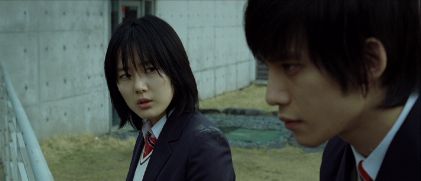
Posted by Peter Nellhaus at 12:02 AM
April 05, 2009
Coffee Break

Ayelet Zurer in Nina's Tragedies (Savi Gavison - 2004)
Posted by Peter Nellhaus at 12:11 AM
April 03, 2009
Philadelphia Film Festival 2009: Tulpan
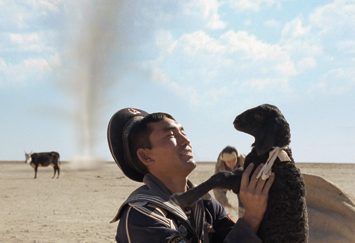
Sergei Dvortsevoy - 2008
Zeitgeist Films 35mm film
I go through moments where I wonder about the value of what I'm writing as well as the value of the films I'm writing about. Without over-intellectualizing, I think that it's a given that for most people, film is primarily a way of reinforcing the familiar. Even for someone like myself who doesn't frequently write about current mainstream films, there is resistance to some films, filmmakers or films from certain parts of the world. I can count the number of films I've seen from Africa with one hand, and they were all made by Ousmane Sembene. More positively, seeing a film, any kind of film, from an unfamiliar country or culture can serve as a gateway to further exploration. The connections do not have to be direct, but a film might serve as an introduction to another language or culture, as well as generating further interest in a particular filmmaker or other filmmakers. At the very least, using a criteria favored by Roger Ebert, a film can sometimes show a place or kind of life that otherwise might remain unknown to the viewer.
After seeing Tulpan, Kazakhstan is now a little less of an abstraction, one of the countries vaguely known as a part of that large mass remembered as part of the Soviet Union. Disregarding any merits Tulpan has as a film, the images may serve as a splash of cold water on the faces of an audience that lives in western or westernized urban areas. Without being an anthropological study, Tulpan depicts lives and an environment that many might find difficult to imagine.
Asa, a former sailor, dreams of being a sheep herder in the Betpak-Dala area of Kazakhstan. An area substantially of desert and scrub plants, there are very few people, primarily families living in yurts miles apart from each other. Asa seeks out Tulpan, the only available young woman in the area, as his wife, in part as a means to enable him to maintain his own flock. The film follows Asa as he lives with his sister, brother-in-law and their family.
Tulpan casually observes Asa, the family he lives with, and the other people with whom he comes in contact. There are the nephews and niece, a small boy who rides his stick "horse", an older boy who recites the radio news to his father, and a girl who constantly loves to sing. Asa's friend acts as a courier, delivering food to the remotely located yurts from an unseen larger village, a comic presence who insists that the foldout portraits of large breasted models that decorate his truck are art. Asa's sister remains good-natured and optimistic, while her husband is more stern and pragmatic. The film is scripted although the performers are non-professionals. While Tulpan has incorrectly been described as a comedy, the humor is to be found in the situations, such as a mother camel insistently following a veterinarian, traveling on a dilapidated motorcycle, carting a bandaged camel, or a scene with a frustrated, despondent Asa, knocked down in a small barn, his face licked by a friendly, long horned goat.
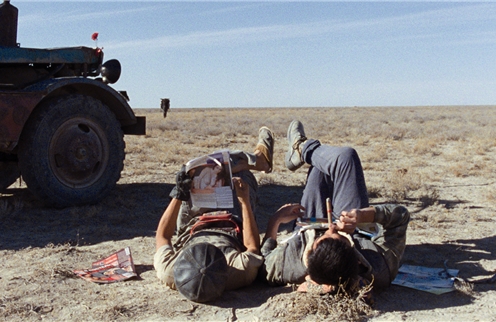
Tulpan is, for me, not an easy film to write about, perhaps because it exists outside of my usual frames of reference. I feel like whatever I might right will just be facile, when the film deserves a discussion of greater substance. What I can say is that Tulpan can be accessible and rewarding, far more than the description of its narrative might suggest.
Dvortsevoy discussed the making of Tulpan in GreenCine.
Tulpan will screen April 3 and 5.
Posted by Peter Nellhaus at 12:15 AM | Comments (2)
April 01, 2009
Philadelphia Film Festival 2009: Art of the Devil 3
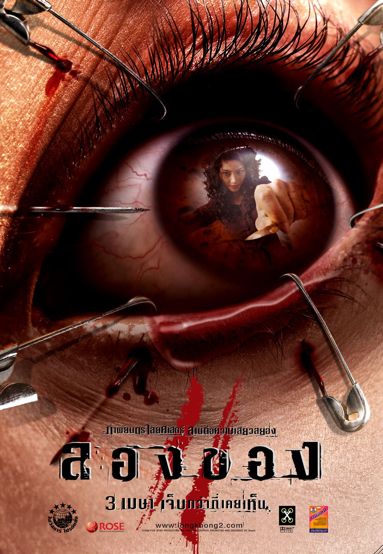
Long Khong 2
Kongkiat Khomsiri - 2008
Five Star Production 35mm Film
It's some kind of devil working to confuse the audience, but the film titled Art of the Devil 3 recounts events leading up to Art of the Devil 2. That said, seeing the older film is not necessary. I wrote about the earlier films last year. As a horror film, Art of the Devil 3 achieves its scares with gruesome detail. The story is couched in very general Buddhist terms about people being trapped by their own karma, but philosophical concerns aside, the general message is that messing about with black magic, no matter what the motivation, does no one any good.

The best reason to see this film is for the gorgeous but scary Napakpapha Nakprasitte. She plays Panor, the victim of a family's misguided attempt to bring a beloved woman back to life with her soul in another body. Aiding in the transfer of souls is a black magic practitioner who will do anything to get a third eye. The family patriarch gets safety pins to keep keep his eyes open, forced by Panor to watch the havoc she creates, revenge for having the soul of a dead woman forced into her body. For those who can look, or take a quick peek, there are hungry ghosts, creepy ghosts, bursting stomachs, maggots, rusty surgical equipment, gallons of blood, and a guy taking a herbal bath, or at least bathing in tub full of branches. This is a horror film for people who not only can imagine the worst, but will see it realized on the screen.
It could also be possible that Art of the Devil 3 might be among the last Thai films to depict extreme violence and horror. A recent posting on the fate of a recent graphic horror film, Meat Grinder, suggests that there could be changes in the genre based on a new ratings system that has yet to officially be in effect. There is also discussion of the film, Slice challenging the ratings as well. Then again, one of the filmmakers who has had a hand in the new ratings, and has the most to gain, was the producer of Sick Nurses, suggesting that the next couple of years may be confusing for both Thai filmmakers and their potential audience. As I have said about the first two films in the series, there's more devil than art, but there are enough horrifying images to satiate the less squeamish of genre fans.
Art of the Devil 3 will screen on April 2 and 4.
Posted by Peter Nellhaus at 12:39 AM